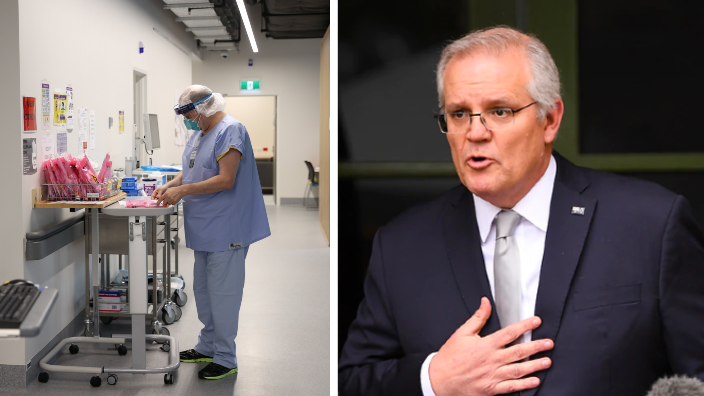On opinion piece by Australian Prime Minister, Scott Morrison.
A focus on case numbers was very important when we knew nothing about this virus and whether our hospital system would be able to cope.
A lot has changed since then. Increasingly we need to look beyond just the case numbers to know what our future holds. How we can keep safe and how we get our lives back in a COVID world.
Case numbers are important, but they are not the whole story.
Our hospital and public health systems are prepared, they have held up to the challenge and continue to do so. And where they have to be reinforced we know how to do that.
Our ICUs have the know how, we have vaccines and the new drugs like sotrovimab that has been approved by the TGA for use that can better treat those who are infected. This all means we can battle Delta and seriously reduce how much harm it does to our health, our way of life and our economy.
So while right now our national strategy is necessarily about suppressing the virus and vaccinating as many people as possible, a one-eyed focus on just case numbers overlooks the fact that less people are getting seriously ill, let alone dying.
READ MORE: Prime Minister – Opinion: Vaccination protects you and your family.
Shifting our focus from just case numbers, to actually looking at how many people are becoming seriously ill and requiring hospitalisation will be increasingly what matters. After all, this is how we manage all other infectious diseases.
The data shows that after an AstraZeneca or Pfizer vaccination, you’re 86 to 87 per cent less likely to end up in hospital or an ICU, and while figures aren’t confirmed about how much vaccination reduces transmission, the evidence from the recent outbreak in Sydney is really strong.
A key next step in our plan will also be getting children aged over 12 vaccinated.
Just as we’ve seen overseas in places like the UK, even when their case numbers tick up, their hospitalisations and deaths are not increasing at the same rate and remaining flatter and at rates like you see with the flu.
It’s always darkest before the dawn, and these hard lockdowns are imposing a heavy toll. They are sadly necessary for now, and we will keep providing health and income support to get people through, but they won’t be necessary for too much longer.
Under our national plan when we start hitting the 70 per cent and 80 per cent vaccination targets, we can start claiming back what COVID has been taking away from us. And when we do so, we must not be intimidated by the case numbers that will inevitably increase. We will be able to better handle them then, because of all the improvements we have made to protect people from serious illness and fatality.
This doesn’t mean people won’t get sick, but with achieving our vaccination targets, a strong public health system, retaining common sense public hygiene measures and more effective treatments for COVID-19 we can get on with our new normal, and treat COVID like other infectious diseases.
That is what our national plan is all about. That’s what all the Premiers and Chief Ministers signed up to.
It’s our path back. It’s our deal with Australians, that by everyone doing what we need to do – push through the lockdowns, stay home, get tested, get vaccinated – we can break out of the current cycle we are in and move forward.
That is the light at the end of the tunnel on our journey. We’ve had three days in a row now delivering more than 300,000 jabs a day and with more than 1.73 million vaccinations delivered in just the last week, even if we do see more case numbers we’re going to see fewer hospitalisations and deaths meaning we can live our lives again.
This is what living with COVID is all about. The case numbers will likely rise when we soon begin to open up. That is inevitable.
But our focus needs to be on the rate of people being hospitalised. That’s the measure that should now start to guide our response.
Rising cases need not impact our plan to reopen, and reopen as soon we can. I know it seems pretty dark now, but it’s always darkest before the dawn, and dawn’s coming. So please hang in there.

